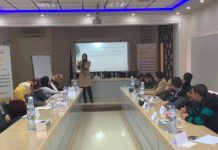By Hani Abuishaiba:
By signing the agreement deal between Fatah and Hamas earlier this year; Palestinians have exploded the status quo that has prevailed in the Gaza Strip and the West Bank.

The recent meeting between Abbas and Mishel has shed light on what appears to be a good level of seriousness to start implementing the principles of the agreement: reforming the PLO, preparing for elections, and building an independent Palestinian State.
Since 2007 fallout, the West Bank-based Palestinian Authority, headed by Abbas, has shunned the Hamas-controlled Gaza Strip while negotiating with Israel. Furthermore, the PA has worked closely with the United States to train responsible security forces and develop an accountable, uncorrupt government.
Why the Reconciliation?
The formalization of the agreement with Hamas has spelled the end of the institution-building program under Prime Minister Salaam Fayyad; better known in Western media outlets as Fayyadism. By doing so, President Abbas turned his back on the prospect of U.S.-brokered peace talks with the Israeli government while failing in his diplomatic offense at the UN corridors to win recognition of a Palestinian state.
With that in mind, reconciliation between Fatah and Hamas is a substantial step on the path towards peace and democracy. Let’s face it and be realistic! Without it, no agreement on the creation of a Palestinian state would have any chance of success for a number of reasons: First of all, any peaceful settlement with the Israeli side cannot be achieved with only those representing half of the Palestinian people. Second, conducting productive negotiations requires a more powerful Palestinian status. This status can only be achieved through ending the division and reconciling all the political differences. More importantly, the reconciliation will give the Palestinian the opportunity to run elections that will give a renewed legitimacy for the political system. This legitimacy will help creating the conditions for the birth of a new democratic movement (pluralistic) in the Middle East.
Moreover, the urgent need of a Palestinian reconciliation is a result of a strong demand stemming from the Palestinians in Gaza, West Bank, and abroad. Thus, there is a popular demand for a genuine reconciliation between Fatah and Hamas inspired by the waves of democratic revolutions that have been sweeping the Arab World, calling for “an end to the divide”. This popular movement is characterized by a demand of not only an independent state, but also a democratic one as they know without a genuine unity democracy is not possible.
What is the significance?
Departing away from main stream views commonly held by Israel and the US that the Arab Spring will turn to the region into a theocracy echoing the Khomeini’s revolution of 1979, the events unfolding in the Middle East offer an opportunity for a genuine democratization. Indeed, this democratization in the Arab world and Palestinian reconciliation can create the conditions to eliminate and isolate the elements of extremism from the political scenes of Palestinians and Israelis.
Both, the Arab Spring & the Palestinian Reconciliation present the perfect opportunity for the international community led by the US to change their policy towards Palestine in line with the calls that Palestinian should fight for their just cause through peaceful means. Reconciliation is surely part of this process.
As Hamas and Fatah becoming more rational in their politics, all the inputs refer to the high possibility of reaching an agreement between them; the U.S. and Europe should vouch for the reconciliation and make it possible. Contrary to what Israel is contending; the recondition is clearly in the best interest of ending the occupation and achieving a long lasting peace. A unified and democratically elected Palestinian leadership is a prerequisite for creating a state.











